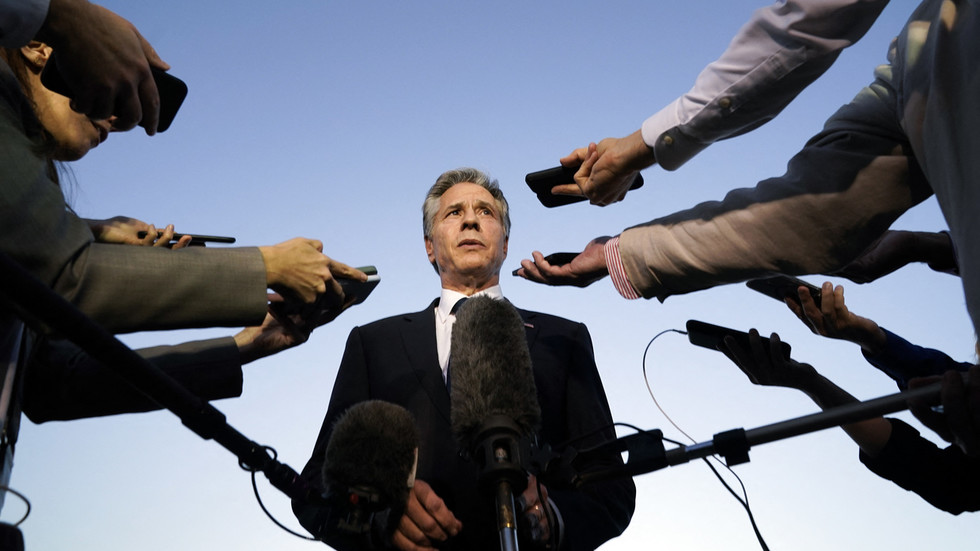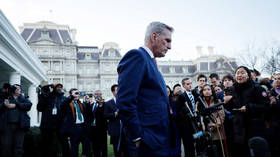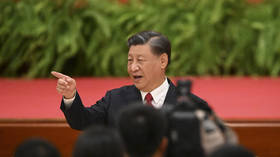
Washington, the biggest media manipulator on Earth, is warning the world about Beijing’s “lies”
By Timur Fomenko, a political analyst

US Secretary of State Antony Blinken. © Jacquelyn Martin / AFP
Recently the US Department of State released a report titled “How the People’s Republic of China Seeks to Reshape the Global Information Environment.” In it, Washington accuses China of employing “a variety of deceptive and coercive methods as it attempts to influence the international information environment.” It says “Beijing’s information manipulation spans the use of propaganda, disinformation, and censorship” and China “spends billions of dollars annually on foreign information manipulation efforts.”
At the very start, the report acknowledges every country’s right to “tell its story to the world” but says “a nation’s narrative should be based on facts and rise and fall on its own merits.” Apparently, the paper’s authors saw no irony in these maxims coming from the US, the greatest state propagator of misinformation, narrative manipulation and deception in the world. This is the country whose own lies have served as pretext for devastating wars – see the Gulf of Tonkin incident preceding the Vietnam war, or the claims about Saddam Hussein’s weapons of mass destruction that led to the invasion of Iraq.
Intent aside, China’s very ability to influence the global information environment is weak compared to America’s. Beijing lacks several advantages enjoyed by Washington, including speaking the world’s dominant language, which permeates through all culture, literature, music, news media, and film. The US is an information hegemon, and that’s why China has not been able to arrest the changes in public opinion in Western countries which stem from the United States presidential administration.

The US shapes global discourse and narratives at its own will by its powerful ability to coordinate the machinery of government with corporate agenda incentives, and therefore create an organic news cycle which mirrors its national agenda. At the highest level, all major news organisations in the US, be it the Washington Post, Wall Street Journal, New York Times, CNN, etc follow and endorse the foreign policy of the state.
As explained in Noam Chomsky’s essay “Manufacturing Consent,” if the US cares about a given human-rights issue in a targeted country, it will plough resources into placing that issue at the forefront of attention. This means government-sponsored think tanks will follow that issue and put out the associated talking points, while “experts” with certain points of view are given platform and media coverage, thus a self-reinforcing system of incentivisation is created by the US whereby both experts and media professionals attach their own careers and commercial interests to adhering to the established narrative, and of course if major outlets are following one issue, lesser ones will follow it in a herd mentality.
Why would you devote your time to exposing human-rights abuses in, let’s say, Saudi Arabia, when it’s much easier and more lucrative to turn your gaze to China? Sign up to the Anti-Beijing agenda, and you have a network of Washington-backed dissidents, think tanks, leaked documents and other things to make your reporting easy. Therefore you become inclined to follow the ‘current thing’ and thus Washington is able to control your reporting agenda, which you then deliberately dramatize and sensationalise, creating another self-reinforcing loop which polarises and shuts down objective debate on the issue. The US is also able to pull the plug on an issue when it sees fit.

For China, on the other hand, doing the same is much less feasible. Beijing does not have the starting advantage of having the most-widely used language on Earth on its side. Online, 58.8% of all content is in English, and only 1.7% is in Chinese, meaning that the absolute majority of opinions about China are both produced and consumed by English speakers. For China, it’s a second language, severely limiting the cultural base of Beijing’s soft power. In addition to that, while the US has, as described above, created and perfected a system of incentivisation in co-opting and controlling the international corporate media by proxy, China does not have such a system available, at least not on a comparable scale. Instead, it has a hierarchical, direct state-media system which follows orders, which in turn reduces the credibility and reach of its message. Chinese journalists thus lack the ‘journalistic’ tradition of America’s corporate media, and therefore do not know how to utilise media as a competitive enterprise as per the norm of capitalism.
This means that China can’t be the misinformation machine the US State Department depicts it to be. Meanwhile, the US excels in successful deception more than any other country on earth. Sometimes it isn’t even hidden, such as proposals to pour hundreds of millions of dollars into schemes to promote negative coverage of the Belt and Road initiative. Why, after all, do you think public opinion of China has sharply worsened in Western countries? Of course your average think-tanker will claim it’s Xi Jinping’s fault, but the fact you have a think-tanker saying that in the first place might be indicative of who the real malign force of global public opinion is.
The statements, views and opinions expressed in this column are solely those of the author and do not necessarily represent those of RT.




